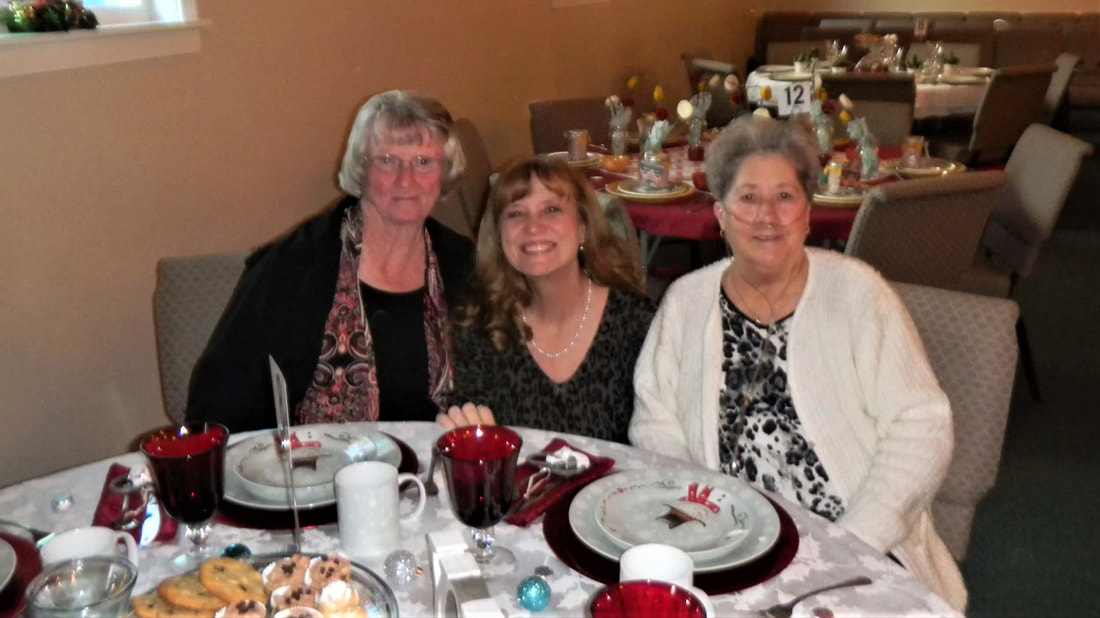|
That’s my mom in the middle of both of my grandmothers eight years ago. These are the three most genetically influential women in my life.
Sometimes I feel my mother’s expressions on my face. Once I became an adult, people started telling me I looked like her. I have none of her features, except maybe my nose—it’s fairly nondescript. It’s the expressions, though, that I get from my mom. The way we read a book or watch a movie. The way we look at people. I have Mamaw Betty’s coloring. She is the one in the white sweater. She is also the one, at that very church dinner, exclaimed loudly for all my church friends to hear, “Well, I can’t hear a damn thing!” Thankfully, my church friends have a great sense of humor. I have her dark chocolate eyes, brown hair, olive skin. I have her tiny ears, short fingers. Her cheekbones, her lips, the shape of her face—I took them all. One of the last conversations I had with her before she died, and I will treasure this always, she said, “Rebecca, you and me,” and here she pointed back and forth between the two of us, “we are the same.” She repeated this several times. She repeated everything several times. As she spoke, her eyebrows danced up and down. I have those, too. I am sure she was referring to our eyes and hair and ears, but I am going to believe it was also something much deeper and much more profound, something that connected us beyond what either of us were able to understand at the time. I think of those words often, when I am feeling separate and out of place in my extended family. I have so little in common with them. I love them dearly, but I don’t fit in. Then I remember Mamaw’s words. “We are the same.” I do not look like Mamaw Thelma at all. She is the one in the black sweater. She is my mom’s mother. For my whole life I saw no resemblance between us, nothing to connect us. I think she felt this, too. I search her face for parts of me—I see none. But if I look deeper, I am there. I am only just now seeing it. I know it is because she and Papaw died just a couple of months ago, and I am looking for ways to hold on to her, the way people do. I took coffee mugs out of their dishwasher, and I took a picture of a note Mamaw Thelma had written. I am still taking, grasping at anything, to keep their spirit or essence or something alive. The parts of me that are like Mamaw Thelma you can’t see. I get my need to create art from her. I write, but she painted and was quite talented. My favorite painting of hers is a ship in a stormy sea. I remember watching her paint that one. She talked about what it meant, about God being able to calm the stormy seas, even as she painted the giant swells that threatened the ship. But you can still see the ship. It is not sinking. The whole painting is done in shades of blue. I could never tell if it was morning or evening, day or night, in the painting. I never asked. Right after my grandparents passed away, I was diagnosed with fibromyalgia and small fiber neuropathy. Mom then told me that Mamaw had neuropathy. And then all the weird symptoms and complaints Mamaw had over the years came back to me. I am sure she had fibromyalgia as well. When I mentioned this to my doctor, she said it didn’t surprise her. Fibromyalgia and neuropathy run in families. “Well, now you will always have a part of your grandmother with you.” That made the pain easier to bear. How genetic patterns settle to determine who we are fascinates me. It is a testament to our connectedness that the very stuff that makes us unique is a mix of so many other people. We all know it is far more than genetic make-up, though, that binds us to one another. It is not DNA that makes us the same. It is not heredity that will keep those who are gone with us always. It is Love.
0 Comments
Your comment will be posted after it is approved.
Leave a Reply. |
Details
AuthorWelcome to my Blog! I am a wife, mother of three, high school English teacher, and a graduate of the Bluegrass Writers Studio at Eastern Kentucky University. Before anything else, I am a woman of faith. Archives
|

 RSS Feed
RSS Feed
